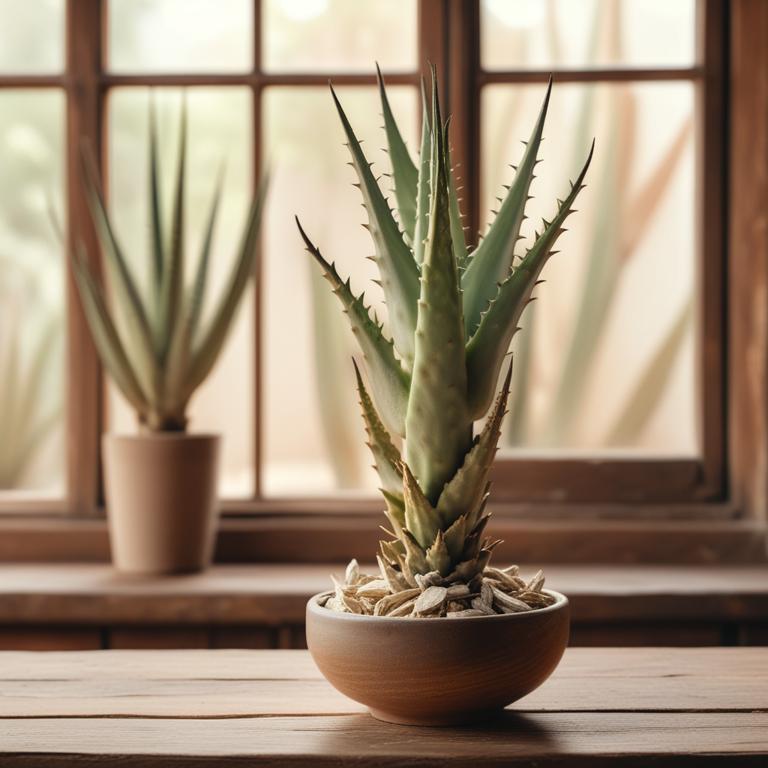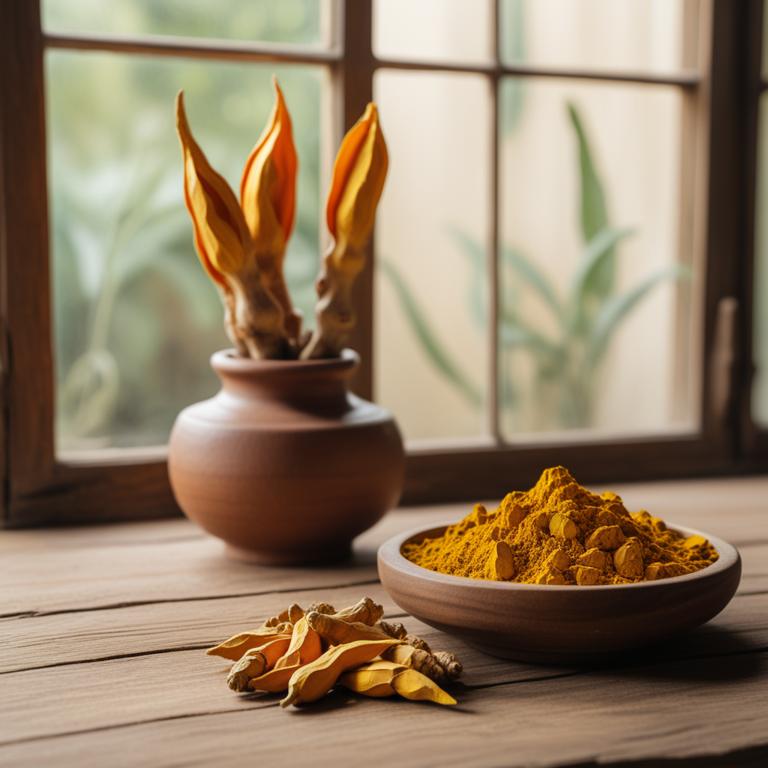Updated: Dec 1, 2024
Red Eyes: Causes, Herbal Preparations, and Home Remedies

Red eyes, also known as conjunctivitis, is a common condition where the eyes become inflamed and turn red.
It can be quite uncomfortable and affect your daily life, making it difficult to perform tasks that require clear vision, like reading or watching TV. There are several causes of red eyes, including allergies, irritants like dust or pollen, and infections caused by bacteria or viruses. Sometimes, red eyes can also be a symptom of a more serious condition, so it's essential to consult a doctor if the condition persists or worsens.
Fortunately, there are some herbal remedies that can help alleviate red eyes. Herbs like aloe vera, chamomile, and calendula have anti-inflammatory properties that can soothe and calm the eyes. These herbs can be used in various preparations to treat red eyes. For example, you can make a tea by steeping dried aloe vera leaves in hot water, or you can apply a cooled chamomile tea bag to your closed eyes to reduce inflammation.
You can also use calendula cream or eye drops to directly apply the herb to your eyes.
Table of Contents
What leads to the occurrence of red eyes?
The main causes of red eyes are often related to issues with the eyes, nose, or environment.
Allergies can cause red eyes due to the body's reaction to allergens like pollen or dust, which leads to inflammation and increased blood flow in the eyes. Dry eyes occur when the eyes don't produce enough tears, causing irritation and redness.
Sinusitis, an infection or inflammation of the sinuses, can lead to red eyes because the sinuses and eyes are connected through a small passage, allowing irritation to spread. Exposure to irritants like smoke, wind, or chemicals can also cause red eyes as they can dry out and damage the eyes.
Conjunctivitis, commonly known as pink eye, is a highly contagious infection that can cause redness, discharge, and swelling in the eyes.
What are the advantages of using herbs for red eyes remedy?
Using herbs to treat red eyes can be a great alternative to traditional methods.
One of the main benefits is that they are often very soothing and can help reduce puffiness and swelling. This is because they have anti-inflammatory properties that can calm the eyes and surrounding skin.
Some herbs can even help to reduce the appearance of dark circles under the eyes, giving you a more rested and refreshed look. Additionally, many herbs are rich in antioxidants, which can help protect the eyes from damage caused by free radicals. This can help to reduce the risk of age-related vision problems and keep your eyes healthy for years to come.
By applying herbal remedies to the eyes, you can also help to loosen and clear out any debris or irritants that may be causing the redness in the first place.
What are the main medicinal herbs for alleviating red eyes?

Herbs can be a great help when you have red, irritated eyes.
Euphrasia officinalis, also known as eye bright, is a natural remedy that has been used for centuries to soothe and calm the eyes. Its anti-inflammatory properties help reduce swelling and redness, while its soothing effects calm the eyes and make them feel more comfortable. Aloe barbadensis, or aloe vera, is another herb that's known for its soothing properties.
When applied to the skin around the eyes, aloe vera can help calm the irritation and reduce redness. Echinacea purpurea is an herb that's often used to boost the immune system, but it can also help reduce inflammation and fight off infections that can cause red eyes. Calendula officinalis, or marigold, has anti-inflammatory and antiseptic properties that can help soothe and heal the skin around the eyes, reducing redness and discomfort. Hypericum perforatum, or St. John's Wort, contains compounds that can help reduce inflammation and fight off infections, which can contribute to red eyes.
These herbs can be used in various forms, such as teas, tinctures, or creams, and can be applied directly to the affected area or taken internally to help alleviate red, irritated eyes.
What are the commonly used herbal treatments for red eyes?

If you're experiencing red eyes, herbal preparations can be a great way to find relief.
A decoction is a strong liquid made by boiling herbs in water. Herbs like chamomile and calendula can be used to make decoctions that help calm and soothe the eyes. These decoctions can be applied to a clean cloth and gently pressed onto the closed eyes for a few minutes to reduce puffiness and redness. Herbal tinctures are also effective in treating red eyes. A tincture is a concentrated liquid made from herbs that are soaked in a solvent like glycerin or vodka. Tinctures can be applied directly to the eyes or added to a cool compress to help reduce inflammation and swelling. Peppermint and eyebright tinctures are popular choices for their cooling and anti-inflammatory properties. Eye creams and ointments are great for providing long-lasting relief from red eyes.
These preparations are usually made with a mixture of herbal extracts, oils, and waxes that work together to calm and protect the eyes. Eye creams can be applied directly to the skin around the eyes, while ointments can be applied to the eyelids or directly onto the eyes. Cucumber and aloe vera are popular ingredients in eye creams and ointments due to their soothing and moisturizing properties. Eye drops are also a popular choice for treating red eyes. These drops are usually made with herbal extracts and oils that help to calm and soothe the eyes. Eye drops can be applied directly to the eyes to provide quick relief from redness and puffiness. Echinacea and green tea are popular ingredients in eye drops due to their anti-inflammatory and antioxidant properties. It's worth noting that some herbal preparations may not be suitable for people with certain medical conditions or allergies.
It's always a good idea to talk to a healthcare professional before trying any new herbal remedies.
Additional Resources:
Are there any herbs you should avoid if you have red eyes?
If you have red eyes, it's a good idea to be careful with certain herbs.
Ginkgo biloba, for instance, can make your eyes more sensitive to light. It's not a big deal if you're not using your eyes too much, but if you're someone who spends a lot of time looking at screens or driving, it could cause more discomfort. Podophyllum peltatum, also known as Mayapple, can cause problems in people with eye issues. It's mainly used to treat digestive problems, but it's not recommended for those with eye redness. The same goes for Allium sativum, or garlic. It's not just about the smell, but also about how it can irritate your eyes further. If you're already dealing with red eyes, taking garlic might not be the best idea.
Curcuma longa, or turmeric, is another herb that you might want to approach with caution. While it's great for reducing inflammation, it can also make your eyes more red and itchy. This is especially true if you have sensitive eyes to begin with. Zingiber officinale, or ginger, can also be a problem, especially if you're taking it in large amounts. It can cause irritation and make your eyes feel even more uncomfortable. It's not that these herbs are bad for you, it's just that they might not be the best choice if you're dealing with red eyes. If you still want to use them, just make sure to talk to a doctor or a qualified healthcare professional first.
They can give you advice on how to use these herbs safely and effectively.
FAQ
Are there any specific herbs that can prevent red eyes?
If you experience red eyes, try using herbs like chamomile or eyebright.
Chamomile is known for its soothing properties, which can calm irritated eyes. Eyebright, on the other hand, is said to have anti-inflammatory properties that can help reduce puffiness and redness.
These herbs can be found in herbal teas or eye creams.
Is it safe to use herbal remedies for red eyes during pregnancy?
When you're pregnant, it's best to be careful with herbal remedies.
Some can cause problems, like allergic reactions or interactions with other medicines. Red eyes can be a sign of a bigger issue, like a sinus infection or dry eyes.
If you're experiencing red eyes, talk to your healthcare provider about safe treatments.
Are there any herbs that can reduce the frequency of red eyes?
Some herbs like eyebright and goldenseal may help reduce redness in the eyes.
Eyebright, in particular, has been used for centuries to soothe and calm the eyes. It's thought to reduce inflammation and improve circulation, which can help alleviate redness and discomfort.
Goldenseal has anti-inflammatory properties that may also contribute to its potential benefits for red eyes.
Can i combine different herbal remedies for red eyes?
You can combine different herbal remedies for red eyes, but be cautious.
For example, if you're using tea bags to reduce puffiness, you can also try applying aloe vera gel to soothe the skin.
However, start with small amounts to see how your eyes react, as different herbs can interact with each other.
Related Articles

Natural Remedies for Insect Bites: Causes, Medicinal Herbs, and Herbal Preparations

Puffy Eyes: Understanding the Causes and Finding Natural Remedies

Causes and Herbal Remedies for Toothache Pain

Causes and Treatments for Itchy Scalp Using Medicinal Herbs

Natural Remedies for Dry Eyes: Causes, Medicinal Herbs, and Herbal Preparations






